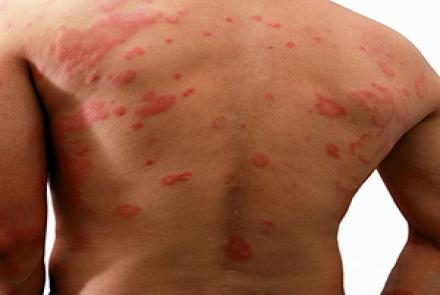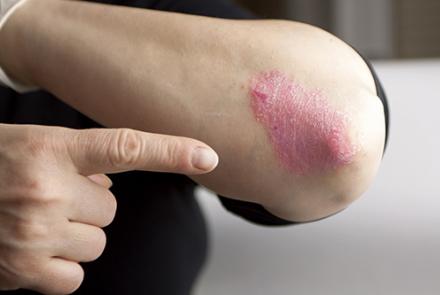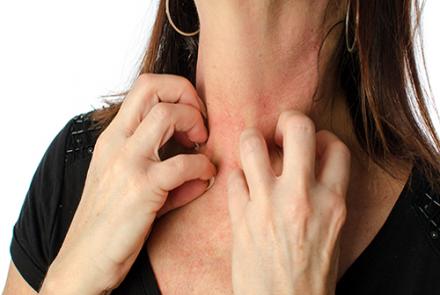
Is stress causing your eczema flare-up? Dr Gita Mathai suggests remedies for different triggers
What is eczema?
The name ‘eczema’ covers a broad spectrum of skin diseases all of which are characterised by itchy, red, crusting and scaling. The skin eventually becomes thickened and hyper pigmented.
What are the types of eczema?
- Atopic dermatitis is the commonest type of eczema. It is caused by various allergies. It affects 20% of children worldwide. Children can ‘outgrow’ eczema, it can persist into adult life or reappear after a symptom-free interval of several years. It occurs on the face, ears, scalp and in flexural surfaces (the folds of the elbows and knees).
- Discoid eczema occurs as flaky, itchy, circular or oval patches all over the body.
- Seborrhoeic dermatitis is seen on the sides of the nose, eyebrows, ears and scalp.
- Contact eczema occurs in adults and children only in areas where the body is in contact with the precipitating and aggravating foreign substance. Common areas are hands if they are constantly washed with harsh soap, or where undergarments rub against the skin.
- Varicose eczema occurs in adults with longstanding varicose veins.
- Dyshidrotic eczema appears as tiny blisters on the palms of the hands.
What are the symptoms of eczema?
Eczema causes itching. It may be so severe and uncontrollable that infants, children and even adults rub the affected areas on rough surfaces. They may look for implements with which they can scratch. The skin may be damaged in certain areas. This enables bacteria like staphylococcus aureus (which lives on the surface of the skin) to gain a foothold inside. Redness, swelling fever and other signs of infection then appear. There may be small bumps formed on the skin, which leak clear fluid. The constant scratching may make the skin thickened and pigmented. It may become scaly and flake off.
Who develops eczema?
Eczema is not infectious or contagious. It is genetic and tends to run in “allergic families” where other members have asthma or rhinitis.
In these families, the body has difficulty in controlling the protective reaction when exposed to a foreign substance. It also has difficulty in demarking potentially dangerous “invaders” like bacteria and viruses from relatively harmless contaminants like dust or perfume. The body’s protective mechanism spirals out of control releasing excessive amounts of inflammatory chemicals, which cause sneezing, wheezing and itching.
Are you at risk of developing eczema?
- Genes play a very important role. The abnormal immune reaction that precipitates eczema is inherited. But like all genetic diseases, predisposition does not mean the condition will occur.
- Asthma or allergies may run in the family.
- Urban, polluted environment: The environment plays an important role. Children living in polluted urban areas, fed on cow’s milk formula and exposed to smokers are more likely to manifest the disease.
- Educated mothers: Contrary to the situation in other diseases, educated affluent mothers have a 30% higher incidence of children who develop eczema. This has been postulated as due to the sterile environment they maintain, where the child does not have a chance to become immune to many common allergens, early formula feeding and expensive scented skin drying bath soaps and detergents. Also they tend to moisturise the child’s skin with chemical-containing moisturising creams whose effect does not last long instead of age- old time-tested coconut, sesame or olive oil.
- Obesity alters the body’s inflammatory responses leading to constant low levels of inflammation and increased skin problems like eczema.
Factors that worsen eczema
- Cow’s milk or formula for infants: Breast milk protects against eczema as some of the mother’s immunity crosses over. This helps to make the baby’s immune system less sensitive and likely to react to allergens. Infants being fed cow’s milk or formula may need to switch to a “hypo allergic formula”. This usually contains hydrolyzed cow’s milk. Otherwise they may have to switch to soya milk, though sometimes this may not help. Breast feeding mother’s whose infants develop eczema may need to avoid shellfish, nuts, peanuts and cow’s milk from their diet.
- Diets containing shellfish, peanuts, cow’s milk and wheat may aggravate pre-existing eczema. As each person’s reaction and allergies are different, across the board no particularly food can he held responsible for eczema in everyone.
- Long, hot baths: Dry skin aggravates eczema. Skin loses its moisture with long, hot baths.
- Wool or synthetic materials: These aggravate eczema. Cotton does not, unless the conditions are hot and humid so that sweat remains in contact with the body. While exercising, the newer “sweat wicking” clothes will prevent flare-ups of eczema.
- Stress: This releases chemicals and hormones in the body that can aggravate eczema, cause a flare-up or relapse in a genetically prone individual.
- Scratching: In people with eczema, this could become a pleasurable habit. It damages skin and provides a foothold for bacteria like staphylococcus aureus and viruses, particularly of the herpes simplex group.
- Tobacco in any form aggravates eczema. Smoking or being around people who smoke will also aggravate the condition.
- Detergents: Body washes, soaps and washing liquids can aggravate eczema. They need to be mild and preferably non-scented.
Treatment
Eczema can be tackled but not entirely cured. Long-term treatment and persistence is the key to success and prevention of flare-ups.
The skin should be protected by keeping bath time short. Add a teaspoon of baking soda and a tablespoon of coconut oil to the water. Baking soda (sodium bicarbonate) acts as a mild exfoliating scrub. It also neutralises acidic substances present on the skin. It works in a wide variety of skin and hair conditions.
In infants:
- Prior to the bath, lubricate the baby’s entire body with coconut or olive oil or a mixture of equal volumes of the two.
- Use only mild non-perfumed soap
- Apply non-greasy baby oil or moisturising lotion to the whole body after the bath.
In adults:
- Contact dermatitis disappears if the provoking agent is avoided.
- If varicose veins are present, wear varicose vein compression stockings during the day and elevate the feet at night and whenever possible. If this does not help, surgery may be required. Stagnation of blood in the lower limbs due to varicose veins aggravates eczema.
- If hands must be washed frequently, use the mildest possible soap. Pat the hands dry instead of rubbing them vigorously with a towel.
Medications:
- Local applications are the mainstay of therapy for eczema. First moisturising lotions or calamine lotion should be tried. If there is no relief, then creams containing 1% hydrocortisone can be applied. The eczema may initially clear up, but it may return. Longterm use of steroid creams can cause thinning of the skin. It can aggravate secondary infection.
- In resistant cases that do not respond to topical steroids, calcineurin inhibitors like tacrolimus and pimecrolimus can be used. These ointments are very powerful. They have side effects particularly on the kidney and other organs. They should be used only as a last resort. They are contraindicated under the age of two years.
- Antihistamines can be taken to reduce the itching. They may cause drowsiness.
- If there is secondary bacterial infection, antibiotics may need to be taken to deal with this.
- Light therapy is very effective. The skin can either be exposed to natural sunlight or artificial ultraviolet UVA and narrow band UVB. Longterm use of light therapy can cause premature ageing of the skin and increase the risk for skin cancer. It cannot be used in infants and children.
- In life, a certain amount of stress is inevitable and unavoidable. Stress needs to be tackled with regular exercise, meditation, yoga and tai chi.
Alternate therapies
- Many people are disheartened by the slow response and relapses that occur during allopathic treatment for eczema. They swear by alternative therapy with homeopathy, naturopathy and herbs. No real studies have been done so claims and counterclaims are mainly anecdotal. Herbal and naturopathic medication reduce itching, but not the incidence or frequency of relapses and flare-ups. Acupuncture is also beneficial. These therapies are often combined with dietary supplements, like mega doses of vitamins, zinc, selenium or probiotics. (Note: You need sachets or capsules of pure probiotics. Eating yoghurt will not help as the milk proteins in yoghurt may aggravate eczema.) Electrodes are used to theoretically change the electromagnetic waves of the body in a procedure called bioresonance. (There have been no studies to substantiate this claim. It is anecdotal and hearsay evidence.) Chromotherapy with the use of colour, light and relaxation techniques has also been used. Oil massages are beneficial.
Basic guidelines for eczema management
If you are suffering from eczema or flare-ups, these following points may help keep you relatively free of symptoms and discomfort:
- Stay away from allergens – in your food and the things you use, such as soaps
- Take oil baths – apply oil before bathing and moisturise after with fragrance-free, natural moisturisers
- Exercise regularly outdoors in the sunshine










